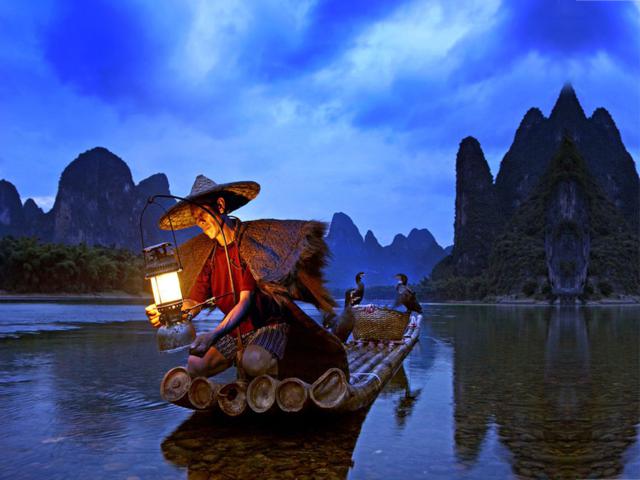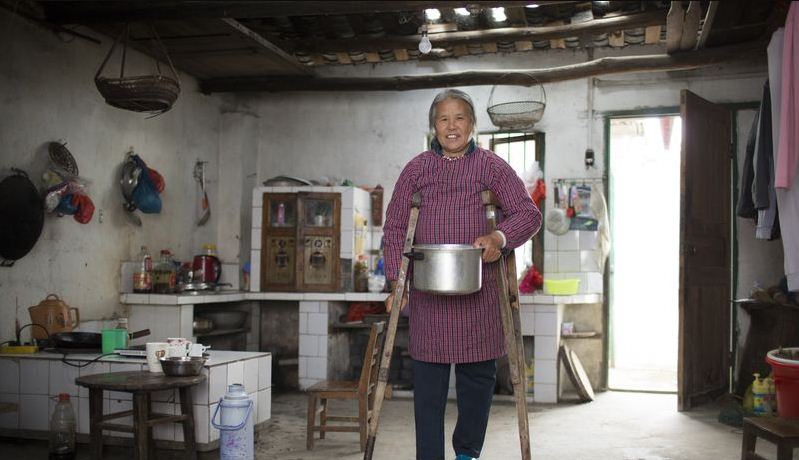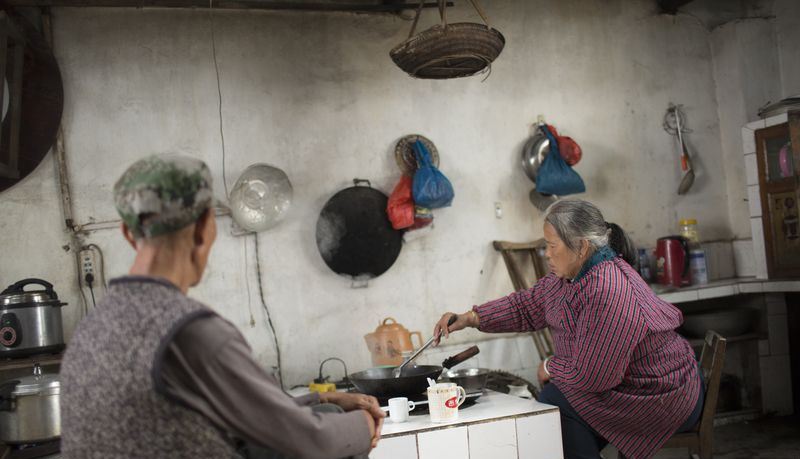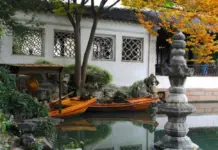A year ago, I read an article about old fishermen who caught fish by using cormorants on the Li river (Lijiang) with a miraculous picture of sunset. And today, my fellow traveler and I are going to China to witness this spectacular way of fishing that has existed for over 1,300 years. Let’s explore cormorant fishing Guilin and the life of Li river fisherman through this my cormorant fishing Li river blog.
- Cormorant fishing Li river — Exploring the art of cormorant fishing in Li River in China
- Xinjiang blog — A journey to the paradise on earth
- My trip to Nepal blog — A journey to the sacred land of the world
- My trip to Norway — Exploring the world of fjords
- Pakistan travel blog — A journey to the roof of Pakistan

Pinpoint the “coordinate” of fishermen
It was not easy to pinpoint the location of fishermen before we departed. We searched for the information on the Internet and found them in Yangshuo County. That was all. With little general evidence, we started our journey.

It was raining in Guilin when we arrived. The temperature in the middle of November was reduced 5-6 degree Celsius at night and the wind was colder. We stayed at a riverside hostel and waited to take the bus to Yangshou the next morning. It was a big problem when we could not speak Chinese. We set up the offline Google Translate App on our phones and used whenever we needed to translate into Chinese. It also helped us to find different streets easier.


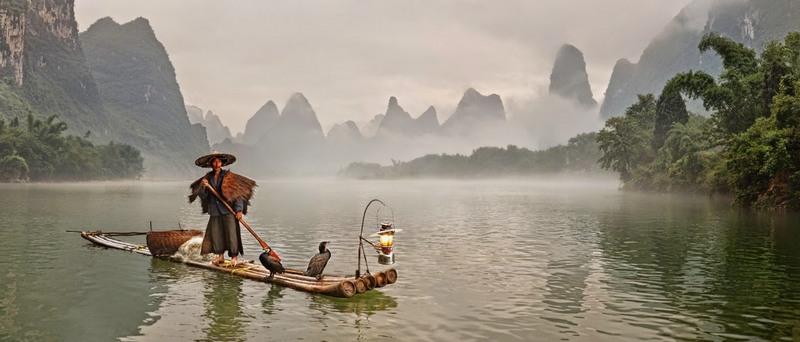
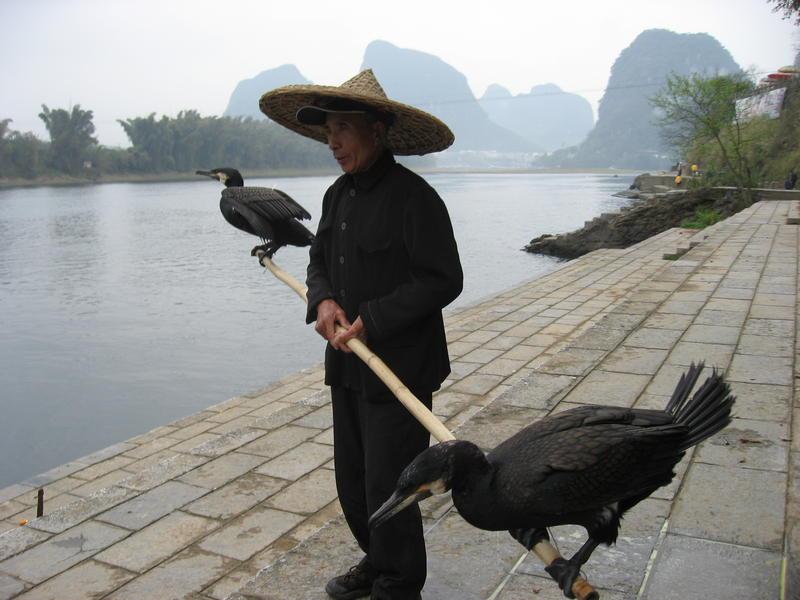
Since local areas in China are located far from each other, you could travel from the morning to 3p.m from any sight to your destination. We finally saw the Li river when we first stepped into Yangshuo. The river appeared picturesque as we walked along the river bank paved with pebbles and a straight line of bamboos. We felt so emotional when thinking that we would meet old fishermen very soon. However, there were only some old people leasing cormorants to take photos with although we walked around for the whole afternoon.
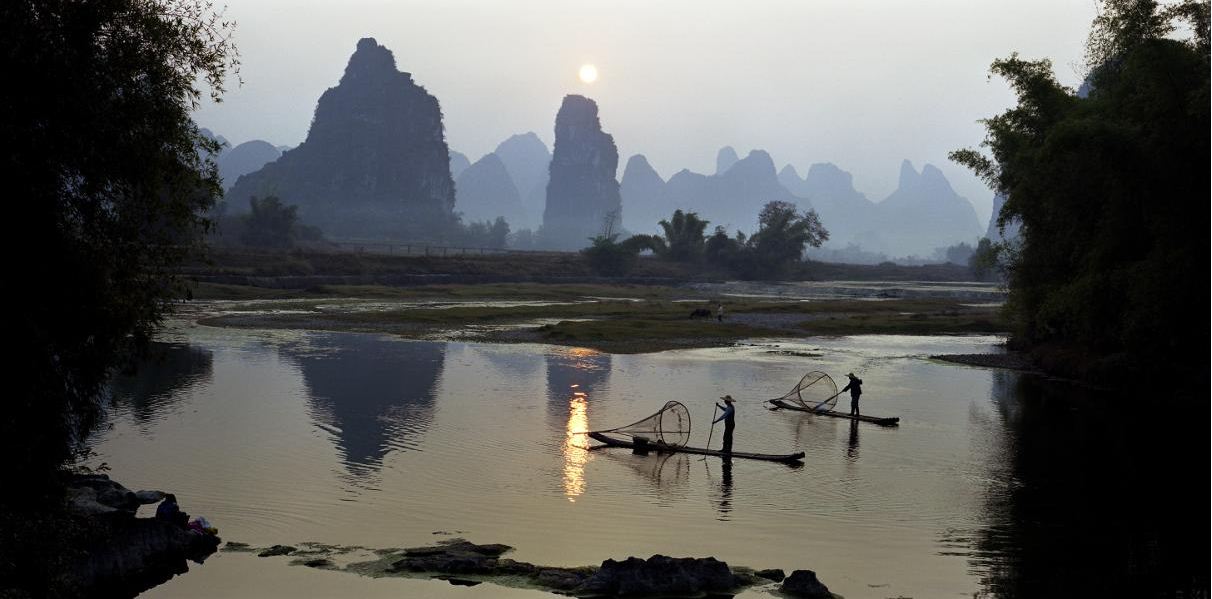
We unwillingly went back to our hotel and asked the owner for more information. “You can’t find them here. You must go to Yangi or Xingping”, said he. We took a bus to Yangi in the following morning because Yangi is located between Yangshuo and Xingping. We hired a tourist boat in the afternoon to sail around the river with a hope that we could bump into old fishermen.



However, we met no one. Finally, we decided to stop at a wharf where there were many Chinese tourists taking photos. I showed the picture of an old fisherman on my phone in front of a local photographer with the hope that he might know something. Luckily, he said he could contact the man but we had to pay him. We agreed although the compensation was rather expensive.

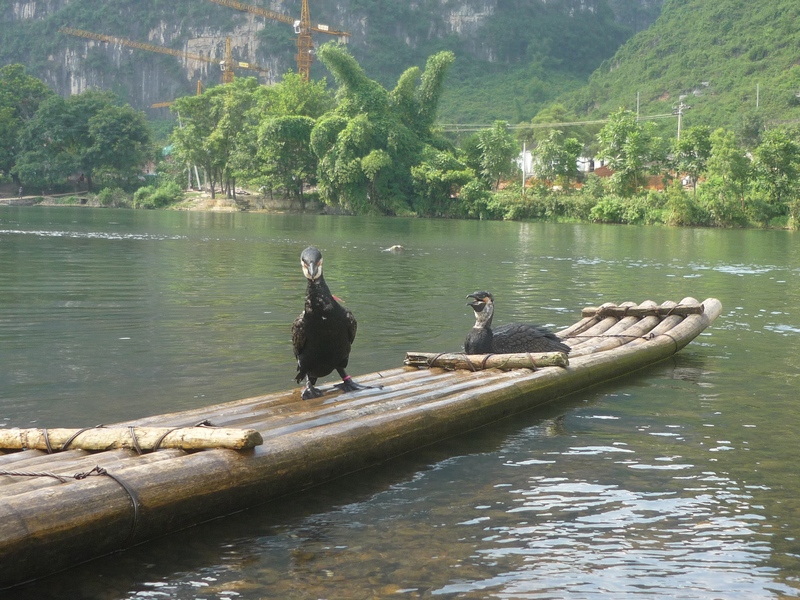
A chance to meet Mr. Huang
After an hour, I heard the sound of the motorboat and an old man came. He anchored and went to see us. We were so happy because finally we could have a chance to meet the man on the newspaper that we had been looking for nearly three days. He showed us an album comprised all of his photos taken and published on magazines. He was certainly a famous man!
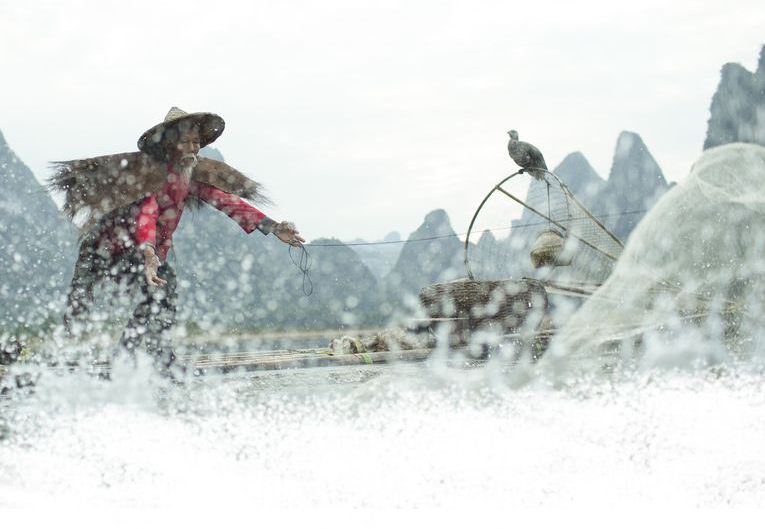
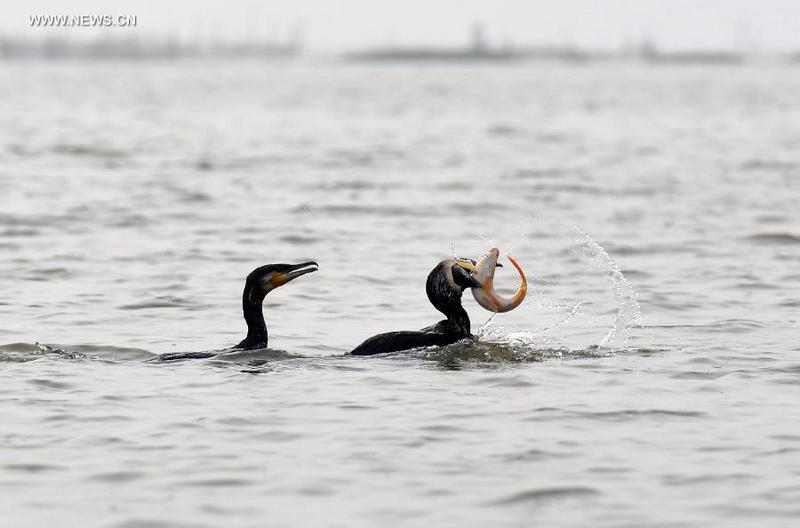
Mr. Huang, the old man, is 69 years old and he goes fishing every day in the Li river. He and his wife are living in a small fishing village. Their children are grown up and have their own lives. He is small and wore a red shirt embroidered with patterns of dragon and phoenix, and further sported a straw coat and bamboo hat. His appearance on the boat in a sunset is much like that of courageous men traveling around the world in fiction novels written by Jin Yong, a Chinese novelist and essayist.
He started to work and I also started to take my photos. Two cormorants looked a little bigger than Muscovy ducks with a tough and strong look. To control the cormorants, the fisherman tied a snare near the base of their throat. This prevented the birds from swallowing fish. The hungry birds dived into the cold water to catch fish and then brought fish back to the man. They were working as two skillful employees. They were awarded some small fish after a working shift.

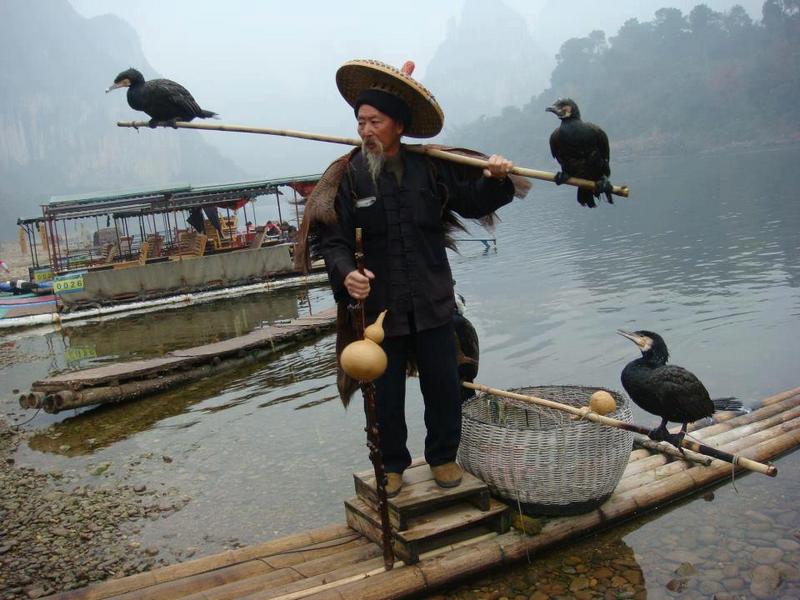

A lunch at Mr. Huang’s house
We said farewell to Mr. Huang after taking a lot of photos and promised that we would visit his house. He gave us a name card with his photo, phone number and address written in Chinese. He told us a lot and although we couldn’t understand, we tried to tell him that we would come tomorrow morning.
We could find the way to his house easily. It is in a fishing village in Xingping. In early winter, the tide goes down and reveals the river bed. His three-compartment house is located in a small lane. His wife treated us to a simple lunch with pork cooked with tofu and noni wine. After the meal, we slept under bamboo trees in their back garden until late afternoon before we said goodbye to Mr. Huang and his wife to continue our discovery journey in China.
Further information
Itinerary
How to get to Guilin: You can travel to Guilin by many ways.
+ By airplane: If you book a ticket of Xiamen Airlines, you will travel from HCMC with a transit at Xiamen, and then fly to Guilin airport. If you take China Southern Airlines, from HCMC, you will have two transits at Bangkok (Thailand) and Nanning (China) before you fly to Guilin.
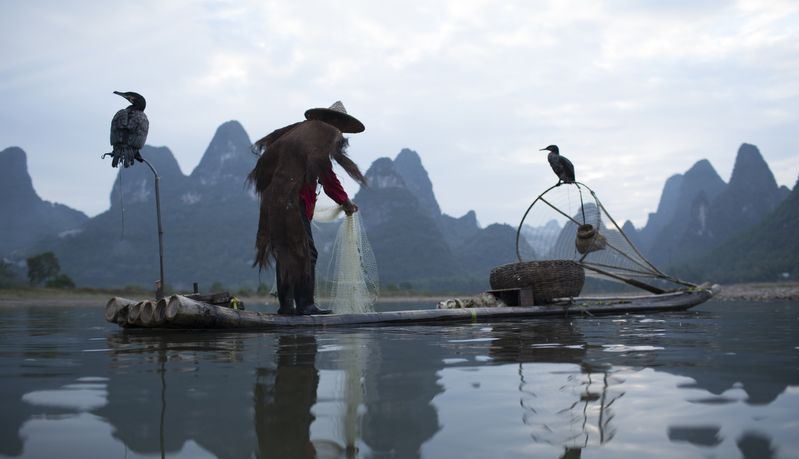
+ By land: From Gia Lam station (Hanoi), you can take a train to Nanning. The train departs at 21:30 daily at VND750,000/ticket (~$33). In addition, if you travel in a group of 6 or more, the ticket price will be VND530,000/ticket (~$24). From Nanning, you can book a flight of Xiamen Airlines or China Southern Airlines to Guilin.
+ To see fishermen, go to Guilin, take a bus to Yangshuo and then take another bus to Xingping. It will take you about a day and a half.
Visa
You can apply for a visa at the Chinese embassy (in Hanoi) or Consulate (in Ho Chi Minh City).
If you want to save time, you can book the services of visa agents.

Language
You should learn some basic communication Chinese such as numbers in order for you to buy things from Chinese people. In addition, set up the Google Translate App on your phone (it can function offline without 3G) to communicate with locals.
Currency
You are advised to exchange Vietnam Dong to renminbi in Vietnam to get a good rate. It’s quite difficult and takes time to exchange in China.

Food
Chinese dishes are often cooked with lots of oil. You should bring some dry foods in case you can’t eat local foods.
Service
Guilin and China as well offer very good services, which are strictly and clearly controlled by the government. Guilin is crowded with Chinese tourists all year round. Chinese account for the main bulk of their tourism along with the addition of foreign tourists.






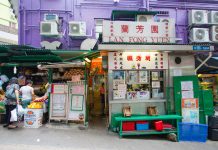

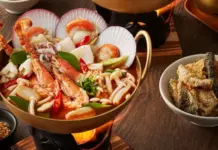










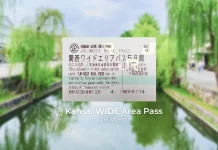










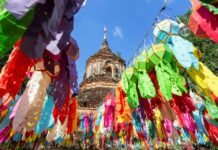

![10 best airports in Asia in 2016 [RANKED] kuala-lumpur-international-airport-best airports in asia in 2016 by skytrax ratings](https://livingnomads.com/wp-content/uploads/2016/08/29/kuala-lumpur-international-airport-best-airports-in-asia-in-2016-by-skytrax-ratings-218x150.jpg)










